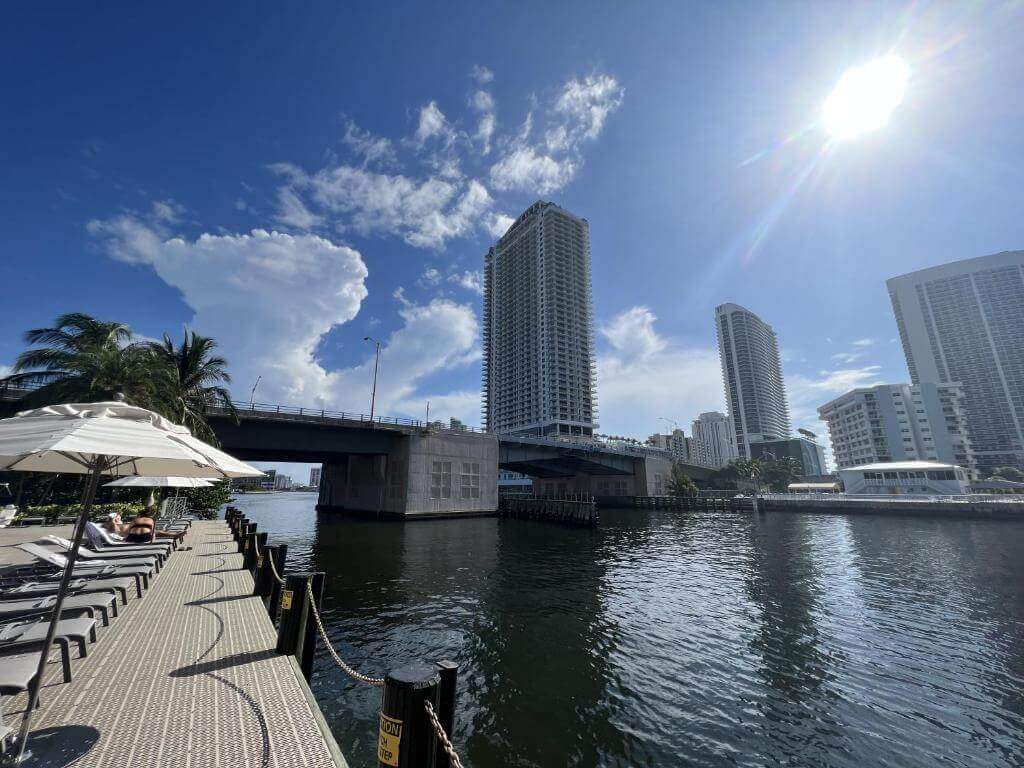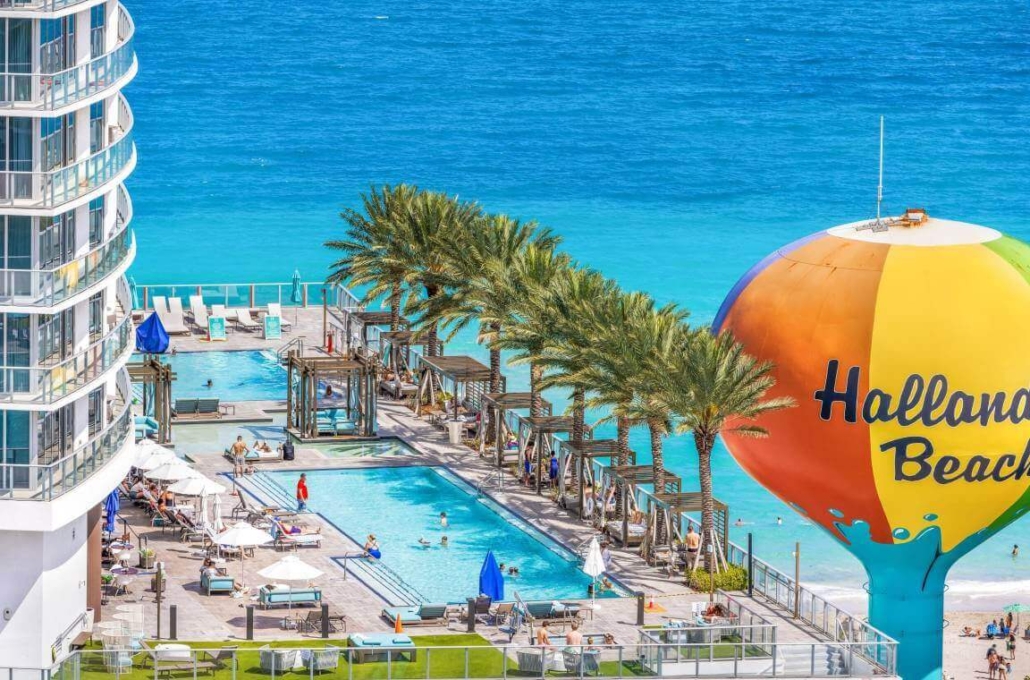Comprehensive Guide to Hallandale Beach Vacation Rental Regulations
Hallandale Beach is a thriving tourist destination in Florida, attracting numerous visitors each year. Vacation rentals play a significant role in accommodating these tourists, offering flexible and comfortable lodging options. However, operating a vacation rental in Hallandale Beach requires strict adherence to local regulations and state laws. This guide provides an in-depth overview of the requirements and procedures for managing vacation rentals in Hallandale Beach.
- Airbnb Profitability in Hallandale, Florida: Things to Know
- How to Start an Airbnb Business in Hallandale, Florida
Overview of the Hallandale Beach Tourism Industry
Hallandale Beach, nestled between Miami and Fort Lauderdale on Florida’s Gold Coast, is a picturesque destination known for its stunning beaches, vibrant culture, and dynamic entertainment options. This idyllic city has become a magnet for tourists from around the globe, drawn by its warm climate, pristine shoreline, and a variety of attractions that cater to diverse interests. The local tourism industry is not only a major economic driver but also a vital part of the community’s fabric, providing numerous benefits that extend far beyond the beach.
Key Attractions and Activities
- Beaches and Waterfronts: Hallandale Beach boasts some of the most beautiful beaches in Florida. The golden sands and clear blue waters offer the perfect setting for sunbathing, swimming, and a variety of water sports, including jet skiing, paddleboarding, and snorkeling. The beachfront also features well-maintained parks, picnic areas, and walking trails, making it an ideal spot for family outings and romantic getaways.
- Gulfstream Park: One of the city’s premier attractions, Gulfstream Park, is renowned for its horse racing track, casino, and shopping village. It provides an exciting day out with a mix of adrenaline-pumping races, gaming, and luxury shopping. The park also hosts numerous events and festivals throughout the year, drawing large crowds of both locals and tourists.
- Cultural and Recreational Activities: Hallandale Beach offers a variety of cultural experiences and recreational activities. The city’s community centers and parks frequently host art exhibitions, concerts, and cultural festivals that celebrate the rich diversity of the area. Additionally, there are several golf courses, tennis courts, and recreational facilities that cater to sports enthusiasts.
- Dining and Nightlife: The dining scene in Hallandale Beach is diverse and vibrant, offering everything from casual beachside eateries to upscale restaurants. Visitors can enjoy a wide array of cuisines, including fresh seafood, Latin American dishes, and classic American fare. The nightlife is equally impressive, with numerous bars, clubs, and entertainment venues that come alive after sunset, providing a lively atmosphere for night owls.
Economic Impact of Tourism
The tourism industry in Hallandale Beach is a significant economic driver, contributing millions of dollars to the local economy each year. This influx of revenue supports a wide range of businesses, from hotels and restaurants to retail stores and entertainment venues. The economic benefits of tourism are multifaceted:
- Job Creation: Tourism generates employment opportunities across various sectors. According to the U.S. Travel Association, the travel and tourism industry supports 1 in 10 jobs in the United States. In Hallandale Beach, this trend holds true, with numerous jobs created in hotels, vacation rentals, restaurants, and tour operators. Additionally, ancillary services such as transportation, retail, and healthcare also see increased demand, further boosting employment.
- Supporting Local Businesses: Tourists contribute to the local economy by spending on accommodations, dining, shopping, and entertainment. According to Visit Florida, the state’s official tourism marketing corporation, visitors to Florida spent approximately $98 billion in 2019. This spending helps local businesses thrive and encourages entrepreneurship, leading to a more vibrant and resilient economy. Small businesses, in particular, benefit from the steady stream of visitors, helping them grow and succeed.
- Infrastructure Development: The revenue generated from tourism often funds the development and maintenance of local infrastructure. Improvements in roads, public transportation, parks, and public facilities enhance the quality of life for residents and make the city more attractive to future visitors. This continuous cycle of investment and improvement helps maintain Hallandale Beach’s status as a top tourist destination.
- Tax Revenue: Tourism-related activities generate significant tax revenues for the city. In Florida, state and local taxes generated by travel and tourism amounted to $27.6 billion in 2019, according to Visit Florida. These funds are crucial for financing public services such as police, fire protection, and sanitation, as well as community programs and social services. The additional tax revenue also helps alleviate the tax burden on local residents, contributing to overall economic stability.
The Role of Vacation Rentals
Vacation rentals have become an integral part of the accommodation landscape in Hallandale Beach, offering a popular alternative to traditional hotels. They cater to a wide range of visitors, from families seeking spacious accommodations to business travelers looking for a home-like environment. The benefits of vacation rentals include:
- Cost-Effectiveness: For many tourists, vacation rentals offer a more cost-effective solution compared to hotels, especially for longer stays or larger groups. NerdWallet found that the average Airbnb for six people was 33% cheaper than booking three hotel rooms. Conversely, the average hotel room was 29% cheaper than booking an Airbnb for two people. This makes vacation rentals particularly appealing for families and groups seeking to maximize their budget. The availability of kitchen facilities also allows guests to save on dining expenses by preparing their own meals.
- Home Comforts: Vacation rentals provide a comfortable and home-like environment, with amenities such as fully equipped kitchens, laundry facilities, and multiple bedrooms. This setup is particularly appealing to families and groups who value the convenience and privacy that vacation rentals offer.
- Local Experience: Staying in a vacation rental allows tourists to experience the local lifestyle more authentically. Many rentals are located in residential neighborhoods, giving guests a chance to live like locals and discover hidden gems that are often missed by traditional tourists.
- Flexibility and Privacy: Vacation rentals offer greater flexibility and privacy compared to hotels. Guests can enjoy their stay at their own pace, with the freedom to come and go as they please. This level of autonomy is highly valued by many travelers, especially those on extended stays.
Future Prospects and Trends
The future of tourism in Hallandale Beach looks promising, with several trends and developments poised to enhance the city’s appeal:
Sustainable Tourism: There is a growing emphasis on sustainable tourism practices aimed at minimizing the environmental impact of tourism activities. Efforts to promote eco-friendly accommodations, reduce waste, and protect natural resources are gaining traction, making Hallandale Beach an attractive destination for environmentally conscious travelers.
Technological Advancements: Advances in technology are transforming the tourism industry. From virtual tours and online booking platforms to mobile apps that provide real-time information, technology is enhancing the visitor experience. Hallandale Beach is leveraging these innovations to attract tech-savvy tourists and improve service delivery.
Cultural and Heritage Tourism: There is an increasing interest in cultural and heritage tourism, with visitors seeking to explore the history and culture of the destinations they visit. Hallandale Beach is well-positioned to capitalize on this trend by promoting its cultural festivals, historical sites, and community events.
Health and Wellness Tourism: The health and wellness tourism sector is expanding rapidly, with travelers looking for destinations that offer wellness retreats, spa treatments, and fitness activities. Hallandale Beach’s natural beauty and serene environment make it an ideal location for such offerings, attracting visitors seeking relaxation and rejuvenation.
In conclusion, Hallandale Beach’s tourism industry is a vital component of the local economy, driving growth and providing numerous benefits to the community. With its stunning beaches, vibrant culture, and diverse attractions, the city continues to draw visitors from around the world. The integration of vacation rentals into the accommodation landscape further enhances the city’s appeal, offering flexible and cost-effective lodging options for tourists. As the industry evolves, Hallandale Beach is poised to remain a top destination, leveraging new trends and innovations to enhance the visitor experience and ensure sustainable growth.

Annual Operating Hallandale Beach Vacation Rental License Requirements
Ordinance 2018-003: Annual Licensing
In accordance with Ordinance 2018-003, all owners of vacation rentals, including rooms and guest houses rented for less than 30 consecutive days, must obtain an annual operating license. This ensures compliance with local standards and contributes to maintaining the community’s safety and quality of life.
Detailed Licensing Application Process
Step 1: Registration Process
Applications: To apply for a vacation rental license, property owners must complete the Vacation Rental Application form and the Business Tax License (BTR) Application. Utilize the Vacation Rental Requirement Checklist to ensure all necessary documents are included. Incomplete applications can result in a pending status and loss of processing fees.
Step 2: Vacation Rental Requirement Checklist
Submit the following information with your Vacation Rental Application:
- Application Fee Payment: Ensure that the correct fee is paid and included with the application.
- Completed Vacation Rental Application: This must be notarized and signed by the property owner, property manager, or authorized agent.
- Division of Transient Public Lodging Establishment License: Obtain this from the Department of Business and Professional Regulation (DBPR).
- Proof of Active Account with Broward County Tax Collector: This demonstrates compliance with local tax obligations.
- Interior Floor Sketch: Include a detailed sketch showing the number and location of parking spaces, fire extinguishers, smoke detectors, and exit routes.
- Evacuation Route Map: Clearly display the evacuation routes for the property.
- Sample Posting Notice: Provide a sample notice that includes all required information.
- Current Local Business Tax Receipt: Ensure this is up-to-date and submitted with the application.
Step 3: Inspection and Compliance
Once the application is submitted, the property will be subject to an inspection to ensure compliance with local building and fire codes, as well as other regulations.
Step 4: Approval and Licensing
If the application and property meet all requirements, the City of Hallandale Beach will issue the vacation rental license. The property owner can then legally operate the vacation rental.
Short-Term Rental Facility Requirements
Vacation rental properties must meet specific facility requirements to ensure the safety and comfort of guests. These include:
Landline Availability: A landline telephone must be available at the property.
Building and Fire Codes: The property must comply with all local building and fire codes.
Solid Waste Regulations: Proper waste disposal methods must be followed, and notices regarding trash regulations must be posted.
Occupancy Limits: The maximum occupancy is calculated based on the available space, with a maximum of four people per bedroom.
Posting Requirements: Additional posting requirements are listed in the ordinance and must be adhered to.

Vacation Rental Licenses’ Fee Structure
The fee structure for vacation rental licenses in Hallandale Beach is as follows:
New Vacation Rental Application Fees
- Vacation Rental License Fee: $300.00
- Annual Processing Fee: $45.00
- Business Tax Receipt/Vacation Rental License Fee: $25.00
Renewal Vacation Rental Application Fees
- Renewal Vacation Rental License Fee: $250.00
- Annual Processing Fee: $45.00
- Renewal Business Tax Receipt/Vacation Rental License Fee: $25.00
Modification Fees
- Vacation Rental Application Modification Fee: $100.00
Operational Standards and Best Practices
Maintaining High Standards of Operation
To ensure a successful and compliant vacation rental operation, property owners must adhere to several operational standards and best practices. These include:
Guest Safety and Comfort
Fire Safety: Ensure that the property is equipped with functioning smoke detectors, fire extinguishers, and clearly marked emergency exit routes.
Sanitation and Cleanliness: Maintain high standards of cleanliness and sanitation to provide a safe and comfortable environment for guests.
Noise Control: Implement measures to control noise levels, especially during quiet hours, to avoid disturbances to neighbors.
Communication and Transparency
Clear Communication: Provide guests with clear and comprehensive information about the property, including house rules, check-in and check-out procedures, and emergency contact numbers.
Transparent Pricing: Clearly communicate all fees and charges to guests upfront to avoid any misunderstandings.
Handling Guest Complaints
Handling guest complaints promptly and professionally is essential for maintaining a good reputation and ensuring repeat business. Implement a clear process for addressing and resolving guest complaints.
Regular Maintenance and Inspections
Conduct regular maintenance and inspections of the property to ensure that all facilities and amenities are in good working order. This helps prevent issues that could lead to guest dissatisfaction or regulatory violations.
Responsibilities of Hallandale Beach Property Owners
Local Contact Person
Each vacation rental must have a designated local contact person who is responsible for managing the property and addressing any issues that arise. The local contact person must be:
- Available 24/7: Able to respond to guest inquiries and emergencies at any time.
- Responsive: Must respond to complaints and issues within 60 minutes.
- Knowledgeable: Familiar with the local regulations and capable of ensuring that the property remains in compliance.
Guest Information Binder
Property owners are required to provide a guest information binder that includes:
Emergency Contact Numbers: Include local emergency services, the property owner or manager’s contact information, and any other relevant numbers.
Local Regulations and Ordinances: Provide guests with information on local noise ordinances, trash disposal regulations, and any other relevant rules.
Instructions for Property Amenities: Include clear instructions for using the property’s amenities and appliances.
Penalties for Non-Compliance
Failure to comply with Hallandale Beach’s vacation rental regulations can result in significant penalties, including:
Monetary Fines: Fines for each violation, which can accumulate daily if not addressed.
License Revocation: The city may revoke the vacation rental license for repeated or severe violations.
Legal Action: In extreme cases, non-compliance may result in legal action taken by the city.
Penalty Schedule
- First Offense: $250.00
- Second or Subsequent Offenses: $500.00
- Reinstatement After Suspension: $100.00
- Appeal Fee: $200.00
Florida State Regulations and Preemption
Preemption Authority
The regulation of public lodging establishments, including vacation rentals, is preempted by the state under Section 509.032(7), Florida Statutes. This means that local governments cannot prohibit vacation rentals or regulate their duration and frequency, ensuring a standardized approach across the state.
Homestead Exemption and Vacation Rentals
Under Section 196.061, Florida Statutes, renting out a homestead property for more than 30 days per calendar year for two consecutive years constitutes abandonment of homestead status for tax purposes. Property owners must be aware of this to avoid losing their homestead exemption.
Human Trafficking Awareness Training
Effective January 1, 2021, all public lodging establishments must comply with Section 509.096, Florida Statutes, which mandates annual human trafficking awareness training for employees. This training includes:
Definition and Types of Human Trafficking: Understanding sex trafficking and labor trafficking.
Identification of Victims: Specific guidance for the public lodging sector on identifying potential victims.
Reporting Procedures: Implementing a procedure for reporting suspected human trafficking to the National Human Trafficking Hotline or local law enforcement.

Airbnb Taxes in Hallandale Beach
Overview of Tax Obligations
Operating an Airbnb or any vacation rental property in Hallandale Beach comes with specific tax obligations that property owners must fulfill. These taxes are crucial for funding local services and maintaining the community’s infrastructure. Understanding and complying with these tax requirements is essential for all short-term rental operators to avoid penalties and ensure legal operation.
Types of Taxes
There are several types of taxes that Airbnb hosts in Hallandale Beach need to be aware of:
1. Florida Transient Rental Tax
The Florida Transient Rental Tax is a statewide tax applied to rental properties rented for six months or less. Guests who book Airbnb listings in Hallandale Beach will pay a 6% tax on the listing price, including any cleaning fees for reservations of 182 nights or shorter. This tax is collected by Airbnb and remitted to the Florida Department of Revenue. For detailed information, visit the Florida Department of Revenue website.
2. Florida Discretionary Sales Surtax
In addition to the Transient Rental Tax, there is a Florida Discretionary Sales Surtax that ranges from 0.5% to 1.5% of the listing price, including any cleaning fees for reservations of 182 nights or shorter. The exact rate varies by county. This tax is also collected by Airbnb and remitted to the appropriate authorities. For detailed information, visit the Florida Department of Revenue website.
3. Broward County Tourist Development Tax
The Broward County Tourist Development Tax, also known as the resort tax, bed tax, or local option tourist tax, is 6% of the rental price for accommodations rented for six months or less. This tax applies to all types of accommodations, including hotel/motel rooms, apartments, rooming houses, mobile home/RV parks, condominiums, timeshares, and single-family homes. The tax must be collected from the guest at the time of payment and remitted to the Broward County Tourist Development Tax Section. For more information, visit the Broward County Records, Taxes, and Treasury Division website.
How to Remit Taxes
Registering for Tax Collection
Before collecting any taxes, Airbnb hosts must register with the Florida Department of Revenue (DOR) and Broward County. Registration can typically be completed online through the respective websites of the Florida DOR and Broward County.
Collecting Taxes from Guests
Airbnb automatically collects and remits certain taxes on behalf of hosts in many jurisdictions, including Florida. However, it is crucial for hosts to verify which taxes are covered by Airbnb and which ones they need to handle independently. If Airbnb does not collect all applicable taxes, hosts are responsible for collecting the remaining taxes from guests.
Filing and Paying Taxes
Hosts must file regular tax returns to both the Florida DOR and Broward County. The frequency of filing can be monthly, quarterly, semi-annually, or annually, depending on the total rental income. Accurate records of all transactions must be maintained to ensure proper reporting and compliance.
For the Broward County Tourist Development Tax, rental receipts and tax must be reported on the Tax Return Form. Tax returns are due on the first of the month following the months of collection and are considered delinquent if not postmarked by the 20th of that month. Payments can be submitted by mail or in person and must be made in U.S. Funds and drawn on a U.S. Bank. After registration is complete, taxes can also be paid online.
Penalties for Non-Compliance
Failure to comply with tax obligations can result in significant penalties, including:
Fines: Monetary penalties for late or unpaid taxes. In accordance with Florida Statute 212.12, there is no collection allowance and a minimum penalty of $50 for filing a late Tourist Development Tax return. A penalty of 10% of the total tax due is added if not more than 30 days late, with an additional 10% for each subsequent 30-day period, up to a maximum of 50% of the total tax due.
Interest Charges: Additional charges on overdue tax amounts.
License Revocation: Potential revocation of the Local Business Tax Receipt, preventing the host from legally operating their rental property.
Legal Action: In severe cases, the city or county may take legal action against non-compliant hosts, including placing a tax warrant lien on the property, issuing a tax execution to enforce collection, and requesting a writ of garnishment to subject any indebtedness due to the delinquent taxpayer by a third person.
In accordance with Florida Statute 125.0104(8)(a), if the person collecting the consideration for the rental fails or refuses to charge and collect the tax from the person paying the rental or lease, that person is, in addition to being personally liable for the payment of the tax, guilty of a misdemeanor of the first degree, punishable by a term of imprisonment not to exceed one year.
Tips for Compliance
To ensure compliance with all tax obligations, Airbnb hosts should:
Stay Informed: Regularly check for updates on tax rates and regulations from the Florida DOR and Broward County.
Keep Accurate Records: Maintain detailed records of all rental transactions, including amounts charged and taxes collected.
Consult a Tax Professional: Consider consulting with a tax professional who specializes in short-term rental properties to ensure all obligations are met and to receive guidance on best practices.
Explore Sunny Isles Beach Short-Term Vacation Rental Regulations.
Check out Delray Beach Airbnb Rules.
Conclusion
Managing short-term rentals involves navigating Hallandale Beach vacation rental regulations. By obtaining the necessary licenses, adhering to operational standards, and ensuring compliance with all relevant laws, property owners can provide a safe and enjoyable experience for guests while maintaining the integrity of the community.












